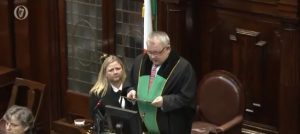
By Sean Ryan - 01 April, 2017

An Oireachtas committee has decided this week to keep the daily prayer in the Dáil and Seanad.
The prayer was first introduced to the Dáil’s schedule in 1932, and since then the Ceann Comhairle and Clerk of the Seanad lead the prayer in their respective houses at the start of each day’s business.
The prayer says: “Direct, we beseech Thee, O Lord, our actions by Thy holy inspirations and carry them on by Thy gracious assistance; that every word and work of ours may always begin from Thee, and by Thee be happily ended; through Christ our Lord. Amen.”
It is also said in Irish.
This week, the Oireachtas Committee on Procedures and Privileges agreed to keep the prayer in both languages, as well as adding an additional 30 seconds of reflection. A number of opposition groups have previously called for the prayer to be scrapped.
Solidarity TD Paul Murphy told Newstalk last year: “In some ways it’s symbolic of items that are very important – which is that we don’t have a separation of church and state in this country. We are about tolerance. I think tolerance would mean we don’t have an explicitly religious moment of reflection at the start of the day.”
Independent TD Mattie McGrath has been a strong defender of the Dáil prayer. When its removal was first mooted in 2014, he said “That agenda is a road former Education Minister Quinn tried to go down and he was met with strong resistance; a resistance that I think will also reveal itself if any move is made to eliminate the opening prayer.”
Earlier this year, an RTÉ current affairs programme showed public opinion is divided on the issue. According to a Claire Byrne Live/Amárach Research poll from earlier this year, 42 per cent of people said each Dáil session should not begin with a prayer, while 42 per cent said it should. A total of 16 per cent said they don’t know.
Only six parliaments in the world have either a prayer or silent reflection in a plenary session. As well as Ireland, these are the US, UK, Australia, Canada and South Africa. Some parliaments such as Denmark and New Zealand have some religious service.
In Australia in 2014, a proposal to remove the Lord’s Prayer at the beginning of the Senate proceedings was defeated. The Standing Orders require the Speaker of the House of Representatives and the President of the Senate to read the prayer at the beginning of each sitting of parliament.